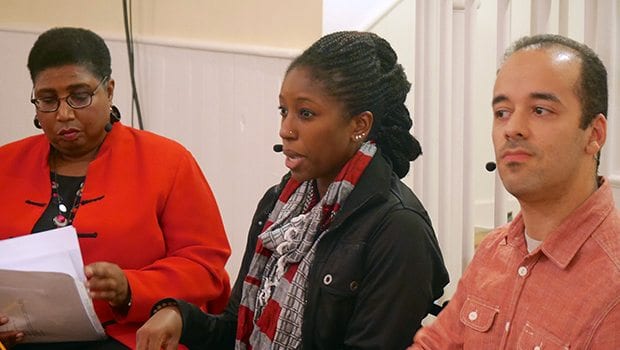
The Ford Hall Forum last week convened a panel of anti-racism bloggers to discuss activism, racism and anti-racism in the era of online communication and social media, 50 years after the Civil Rights Act.
With WGBH radio host Callie Crossley moderating, bloggers Spectra Asala of Spectra Speaks (spectraspeaks.com), Jay Smooth of Ill Doctrine (illdoctrine.com) and Andrew Ti of Yo, Is This Racist? (yoisthisracist.com) conversed about how to respond to racist statements, the strong demand they see for honest race conversation and online communication’s powerful potential but still unequal access.
Asala and Smooth spoke with Crossley before a live audience at the African Meeting House in Boston, while Ti participated remotely.
The bloggers roundly dismissed the idea that the race topic is over, that we already have a post-racial color-blind world, as Crossley said she hears from people over and over.
“I don’t know those people,” Asala said.
On the contrary, the panelists (and Crossley) said they see a craving for real discussion on race.
Smooth, a biracial hip-hop radio host (whose real name is John Randolph), said that when he began video blogging on Ill Doctrine in 2007, he discovered he was tapping into a raw need.
“Each time I delved into our always-frustrating conversations about race, it struck a chord—more than any other topic I touched on,” he said. “It revealed to me how much of a hunger there is for tools and language to navigate where we are with race.”
As a Nigerian who splits her time between Nigeria and the U.S. and writes on Afrofeminist and LGBT issues as well as race, Asala’s view is broader than the American race picture. She said people may be seeking a more nuanced conversation, an acknowledgment that today’s world of race is more complex than the simple “Black vs. white. This or this” of the past.
Smooth reiterated some points from his video blog, “How to Tell Someone They Sound Racist,” in which he urges people to have a ‘what they did’ conversation—focusing on the person’s unacceptable words or actions—instead of a ‘what they are’ conversation.
He noted that saying “you are a racist” sets up a far too simple conversation that often becomes a referendum on whether someone is a good or bad person.
“That’s the roadblock we hit when talking about race,” he said.
Ti, listening in by phone and e-mailing responses to be read aloud by Ford Hall Forum Director Jennifer Bonardi, was more willing to advocate bluntness, albeit with a comic and hyperbolic flair.
One question that annoys Ti, who is Asian American, is “Why is there no ‘white entertainment channel’?” which about a thousand people have asked, he said.
“People write in with their racist views,” he said. “It can sometimes be satisfying to meet Internet racists at their level—with profanity.”
Asala spoke about feeling her privilege in having such easy access to online platforms while in some parts of the world Internet access is expensive and more difficult. But overall, the tone of the discussion was positive, stressing the potential of online communication to connect like-minded people across geography.
“We get so much flak about creating a distance [by being online], but I have formed meaningful relationships online, closer than those in the rest of my life,” said Asala. “With your bio and profile out there, when people say ‘hi’ they know exactly who you are.”
The forum, titled “The Revolution Will Be Online,” was co-sponsored by the Museum of African American History, ArtWeek Boston and the Boston Literary District. The audience was racially mixed, though predominantly white and clearly skewed toward middle-age and older.
In her introduction, Crossley referred to the 1964 Civil Rights Act as “one of the single most comprehensively important bills ever passed in this country” and took a moment to describe its process.
“There was all manner of push, pull, death, struggle, fighting,” she said, “and in the end, it was passed by an all white Congress…who realized that our society had to change.”
Crossley noted the civil rights generation’s “hulking shadow over your generation,” and asked the bloggers whether young people have flocked to online social media to “stake a claim” for themselves.
Asala, who is 33, acknowledged that history can be a heavy weight, and the Internet a liberating medium.
“For my generation, online gives us a little more freedom to express how we’re feeling, away from the policing eyes of our elders,” she said. “This is quite important for young people. Online channels are a way to speak without being spoken over.”
That said, the panelists did not dwell on generational divisions. They spoke instead of blogs and Twitter as part of a progression, a subset of the many means of communication for activism today—and not just for the young.
“Technology [for conveying issues of the times] has evolved from letters and newsletters, to phones, to television and mass media,” Asala noted. “It’s been a natural movement for people of all types to take to this new technology.”






